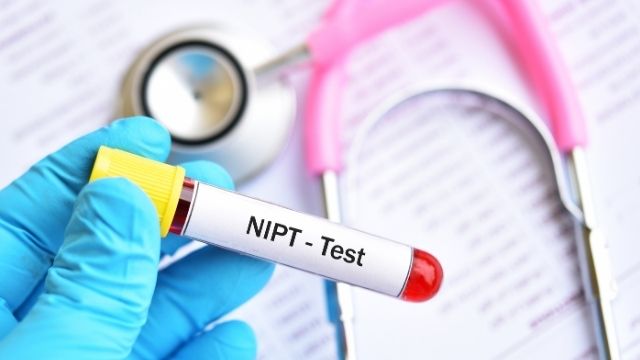NIPT Test in Kharghar
Home | NIPT
SERVICES
- Sonography
- Color Doppler
- Digital X-Ray
- Sonohsg
- USG Guided Interventions
- Obstetric
- 3D/4D
- Color 2D Echo Cardiography
- ECG
- PFT
- Blood Investigation
- Interventional Radiology
- FNAC Test
- NIPT Test
- Prostate biopsy test
- Abscess Drainage
- Breast biopsy test
- kidney biopsy test
- Liver biopsy test
- lymph node biopsy test
- Fetal Echo Test
- Fetal medicine

NIPT Test in Kharghar
What the Test Does?
NIPT stands for Non-invasive Prenatal Testing. Non-invasive Prenatal Testing (NIPT) is a revolutionary advancement in prenatal care. This blood test analyzes fragments of fetal DNA circulating in the mother’s bloodstream. For expectant mothers considering NIPT in Kharghar, this method offers a safer alternative to traditional procedures. Unlike methods like amniocentesis or chorionic villus sampling, NIPT poses no risk to the fetus.
Typically conducted between the 10th and 22nd weeks of pregnancy, NIPT primarily screens for chromosomal abnormalities such as Down syndrome (trisomy 21), trisomy 18, and trisomy 13.It can also determine the baby’s sex and, in some cases, detect certain rare genetic disorders.
A key advantage of NIPT is its high accuracy in detecting chromosomal abnormalities.However, it’s essential to remember that NIPT is a screening test, not a diagnostic one. A positive NIPT result usually prompts further diagnostic tests like amniocentesis or CVS to confirm the diagnosis.
By providing early and accurate information about the fetus’s genetic health, NIPT empowers expectant parents to make informed decisions about their pregnancy.It has significantly reduced the need for invasive procedures, thereby minimizing risks to both mother and baby. As technology continues to evolve, NIPT is likely to become an even more integral part of prenatal care
NIPT is a relatively simple procedure that involves the following steps:
- Blood Draw: A small sample of your blood is drawn from a vein in your arm. This blood contains both your DNA and a small amount of fetal DNA.
- Isolation of Fetal DNA: The blood sample is sent to a laboratory where specialized equipment is used to isolate and extract the fetal DNA from the maternal blood.
- DNA Sequencing: The isolated fetal DNA is then sequenced to identify any chromosomal abnormalities. This involves breaking down the DNA into small fragments and analyzing the order of the base pairs.
- Data Analysis: Powerful computers analyze the DNA sequence data to look for specific patterns associated with chromosomal conditions such as Down syndrome, trisomy 18, and trisomy 13.
- Result Interpretation: The results are interpreted by trained professionals and communicated to the pregnant woman and her healthcare provider.
Non-invasive Prenatal Testing, offers several significant advantages over traditional prenatal screening methods:
- Non-invasive: Unlike amniocentesis and chorionic villus sampling (CVS), NIPT involves only a simple blood draw, posing no risk of miscarriage or infection to the fetus.
- High accuracy: NIPT has a high detection rate for common chromosomal abnormalities such as Down syndrome, trisomy 18, and trisomy 13.
Early detection: NIPT can be performed as early as the 10th week of pregnancy, allowing for earlier decision-making.
